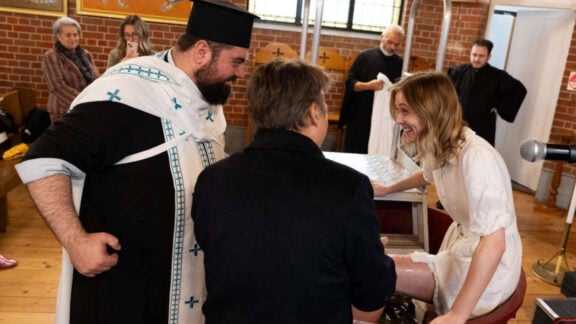“Instead of doing this interview, you may have been writing my obituary,” Philip Dalidakis said over the phone.
“And it’s not Jewish-Greek fatalism” laughed the former Victorian government minister, “this was very real.”
If not for a lunch with mates three months ago, Dalidakis would never have gone for a heart check, and would not have discovered that his left artery was 95 per cent blocked.
“We were having lunch as a group of mates when one of the group told us that he had a heart check,” Dalidakis said, “soon after the death [from heart attack of cricket great], Shane Warne.”
“He then turned around and said, ‘you should all get checked’, we looked at each other and thought, ‘good idea.'”
Dalidakis had no symptoms at all – nothing to suggest he should see a cardiologist.
“I had no pain, no shortness of breath, nothing, zero symptoms, but I thought I’d go to the GP and get a referral to a cardiologist.”
He said that like many men in his age, he was “slightly overweight” he also had Type 2 Diabetes “for the last 12 years.”
The CT scan came back inconclusive, erring on the side of caution, his cardiologist scheduled Dalidakis for an angiogram.
“Now, that was interesting, I had to have a contrast in my veins, but there’s a global shortage of contrast, which comes predominantly from China.”
Angiograms use dye, or “contrast” which is the correct term, to reveal the arteries. Arteries are invisible to X-ray so filling them with “contrast” makes them visible.
Usually, a quick process became longer due to pandemic effected supply chains. It took up to three months from the CT scan to the angiogram.
The angiogram revealed that Dalidakis’ left artery was 95 percent blocked.
“The cardiologist immediately put in an angioplasty – the balloon that clears the blockage – and then inserted a stent.”
“From going into theatre to being moved out, it was 45-minute procedure – beginning to end.”

Dalidakis asked his cardiologist how close he was to a heart attack and the response was, “five percent away … you were 95 percent blocked, five percent more, a 100 percent blocked artery can bring on a heart attack.”
The simple procedure stopped a ticking time bomb, a heart attack said the the former politician. The experience raised some confronting issues for Dalidakis.
“My physical condition was not in question, I haven’t smoked since the 1990s, I do not drink in excess, I carry a few extra kilos, but I do not eat badly.”
We have forgotten about heart health and do not consider heart attacks like we did once, he said.
The cardiologist blamed genetics, Dalidakis’ “hereditary disposition”.
“My father had a heart attack and double bypass when he was around 60, my grandfather had a stroke, and his mother had a stroke when she was older.”
Irrespective of whatever lifestyle changes Dalidakis has made, he will need some medication to help to counter his genetic disposition.
Dalidakis said he didn’t think about the heart.
“That’s a reason what happened to me has resonated with so many people.”
According to the Heart Foundation, deaths from heart attacks have decreased over time, however, one should not be lulled into a false sense of security. Up to 375,000 Australians suffer a heart attack sometime in their life. Twice as many men experience heart attacks compared to women. And, about 20 Australians die of heart attack every day.
The shock that Dalidakis could have been one of the 20 casualties unnerved him.
“I could have fallen on the street, and no one around would know what was happening. What if I was working from home and my wife was out at work when it hit me? I could have died alone.”
Dalidakis, to his surprise, found out that more women die from heart attacks than they do from breast cancer.
Heart Research Australia, in 2021 reported that “heart disease kills more than two times as many Australian women than breast cancer.”
About 40 per cent of heart attacks in women are fatal, and often occur without warning.
“It’s incredible right? We don’t necessarily talk about it in that respect.”
Dalidakis is now a steadfast advocate for heart checks.
“Heart health is one phone call away; I don’t want to preach, but my message is ‘get checked’. You’ve got nothing to lose but everything to gain.”
He had advice to this Neos Kosmos reporter who is of similar age and girth; “Get checked, go to your GP and ask for a referral to a cardiologist.”
“You know what would be great as a follow up?” he said, “Get checked, go through the process, and write about it, tell readers about how simple it is.”
Dalidakis’ edict shall be followed – a heart check is in order.









